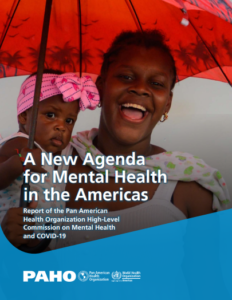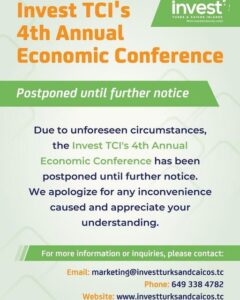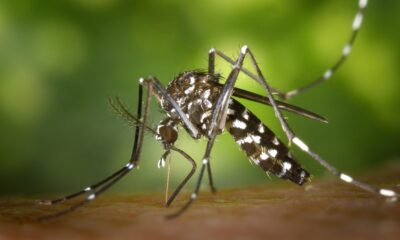By Rashaed Esson
Staff writer
June 18, 2023 – As mental health continue to experience an elevated profile as a global health priority, PAHO reports, “A New Agenda for Mental Health in the Region of the Americas,” was launched on June 9th, 2023, and it highlights recommendations to better address mental health in the Americas following the COVID-19 pandemic which has worsened mental health issues.
The report comes following the establishment of the High-Level Commission on Mental Health and COVID-19, in May of 2022, which comprised 17 experts from Government, civil society, academia as well as those with lived experience of mental health conditions.
May of 2022, which comprised 17 experts from Government, civil society, academia as well as those with lived experience of mental health conditions.
Their job was to give guidance to PAHO and its Member States on how to advance mental health in the Region during and after the pandemic.
The report provides countries with ten recommendations to improve mental health care and they are:
- Elevate mental health at the national and supranational levels.
- Integrate mental health into all policies.
- Increase the quantity and improve the quality of financing for mental health.
- Ensure the human rights of people living with mental health conditions.
- Promote and protect mental health across the life course.
- Improve and expand community-based mental health services and care.
- Strengthen suicide prevention.
- Adopt a gender transformative approach to mental health.
- Address racism and racial discrimination as a key determinant of mental health.
- Improve mental health data and research.
In light of this, Dr. Jarbas Barbosa Director of the PAN American Health Organization (PAHO) called leaders and decision makers to take action, making sure mental health is placed at the top of political agendas and woven into all sectors and policies to better address the growing issue especially after the pandemic.
PAHO expressed that even though mental health has historically been a significant source of disability and mortality in the Americas, responsible for almost one-third of all years lived with a disability, the pandemic increased the risk factors including, grief and loss, unemployment and financial insecurity, and this was emphasized by Barbosa speaking at the launch. He maintained that COVID-19 severely impacted the mental health of the population of the Americas; hence the importance of the recommendations in the report.
In addition to the increase in mental health issues, the preponderance of those with a condition do not receive the necessary care whether that be therapy or medication.
PAHO reports that in 2020 more than 80 percent of those with a severe mental health condition, psychosis included, did not receive treatment.
This partly due to a lack of access to services to help with mental health and Barbosa expressed this is due to a variety of factors before the pandemic including: “low investment, only 3% of countries’ health budgets are allocated to mental health; a reliance on long-stay hospitalization when the majority of mental health problems can be resolved in the community; a chronic shortage of trained mental health personnel; and reduced access to services for those living in vulnerable situations.”
Considering the report as well as the facts highlighted, investing in mental health is key to bring about the best result in mitigating its impact on people of the Americas, and Dr. Epsy Campbell Barr, Chair of the Commission and former Vice-President of Costa Rica, spoke to this saying, “Investing in mental health is crucial to promote equitable and sustainable human development for all to live with well-being and dignity,” further fingering that mental health is a public issue, not private, which requires urgent and immediate attention.
In continuation, Dr. Nestor Mendez, Co-Chair of the Commission and Assistant Director General of the Organization of American States, expressed that mental health is now in their hands, that is the leaders in the region, to change how they approach handling it.
PAHO made reference to mental health statistics throughout the Americas, further highlighting the importance of addressing it in the best way possible.
Some of the statistics say:
- In 2020, during the COVID-19 pandemic, major depressive disorders increased by 35 percent and anxiety disorders by 32 percent .
- 65 percent of countries reported disruptions to essential mental health and substance use services in 2020. This number has decreased to 14 percent in early 2023.
- 8 our of 10 individuals with a severe mental health condition do not receive treatment
- Suicide claims the lives of nearly 100,000 people each year.
- The regional age-adjusted suicide rate increased by 17 percent between 2000 – 2019.
- Depressive and anxiety disorders are the third and fourth leading causes of disability.
Mental health should not be taken lightly and should be treated like any other illness as it is in fact an illness and is just as dangerous as visually physically conditions.


 Caribbean News7 days ago
Caribbean News7 days ago
 Caribbean News7 days ago
Caribbean News7 days ago
 Caribbean News1 week ago
Caribbean News1 week ago
 Caribbean News7 days ago
Caribbean News7 days ago
 Bahamas News7 days ago
Bahamas News7 days ago
 News7 days ago
News7 days ago
 Bahamas News1 week ago
Bahamas News1 week ago
 News7 days ago
News7 days ago
























